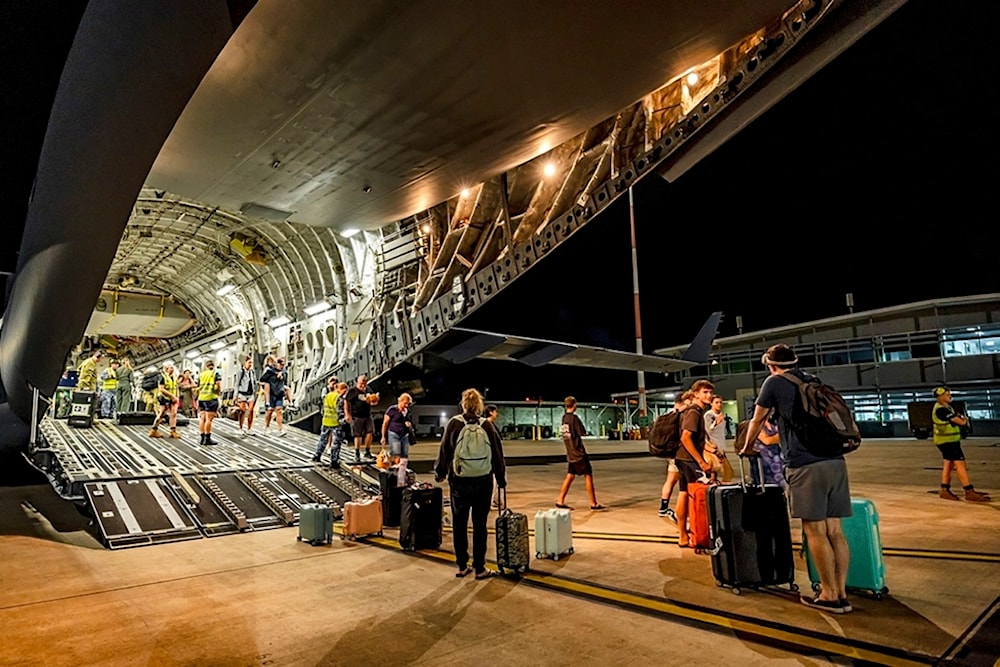Vanuatu’s new PM plans to reassess 2022 security pact with Australia
Napat also called for the inclusion of a waiver-free travel agreement with Australia to facilitate easier movement between the two nations.
-

In this photo released by the Australian Department of Defense, Australians disembark from an aircraft at RAAF Base Amberley, Australia, after a flight home from Port Vila, Vanuatu, Wednesday, Dec. 18, 2024, following a powerful earthquake that struck just off the coast of Vanuatu in the South Pacific Ocean. (CPL Adam Abela/Australian Department of Defense via AP)
Vanuatu’s new Prime Minister Jotham Napat has expressed his government’s intent to reconsider a security agreement with Australia, citing the need for it to better align with national priorities, particularly climate change and travel mobility, The Guardian reported on Wednesday.
Napat, who assumed office in February, stated that the agreement, signed in 2022 but not yet ratified by either nation, must be revisited to ensure a “win-win” outcome. He told The Guardian that climate change, a critical security issue for Vanuatu, was "not reflected" in the current pact.
“It’s something that we would like to revisit and be able to discuss openly with the Australian government,” he said.
The security deal aims to enhance cooperation on disaster response, policing, cybersecurity, and border security. However, climate change is mentioned only once in the document, under a section on “Environment and Resource Security,” the news website noted.
Beyond climate considerations, Napat also called for the inclusion of a waiver-free travel agreement with Australia to facilitate easier movement between the two nations. He confirmed that he had already raised these concerns with Australian officials, including Deputy Prime Minister Richard Marles, and that they were receptive to revisiting the agreement.
In response, a spokesperson for Australia’s Department of Foreign Affairs and Trade said Canberra welcomes Vanuatu’s interest in strengthening bilateral ties and remains attentive to its priorities.
The Guardian suggested that Australia’s pursuit of security and policing agreements with Pacific nations—including Papua New Guinea, Tuvalu, Solomon Islands, and Fiji—is widely regarded as part of its broader strategy to counter China’s growing regional influence.
The report highlighted that Beijing has significantly expanded its diplomatic, economic, and security presence in the Pacific, most recently signing a comprehensive strategic partnership with the Cook Islands covering areas such as deep-sea mining, education, and transportation.
When asked about China’s involvement, Napat maintained that Vanuatu does not favor any particular development partner. “We treat Australia the same as China and the United States,” he said.
Mihai Sora, Director of the Pacific Islands Programme at the Lowy Institute, noted that Vanuatu is in a strong position amid the ongoing geopolitical competition.
“Vanuatu has a lot of leverage right now – Australia needs these sorts of security partnerships,” he said. “It’s looking to formalise existing activities and to elevate existing agreements wherever it can in a bid to build strategic insulation from China’s encroachment.”
According to Sora, China has been employing an “opportunistic approach” to security cooperation in the Pacific, offering support to individual leaders who express interest. “China is looking to elevate its political ties and then for that to open the way for closer security cooperation across the Pacific.”
The Guardian mentioned that Vanuatu’s efforts to renegotiate its security deal with Australia coincide with the United States scaling back some of its commitments to Pacific nations, particularly in economic development and climate action.
US President Donald Trump’s decision to withdraw from the Paris Climate Agreement is a matter of grave concern for Vanuatu, Napat said, given the existential threat climate change poses to the island nation.
“For us, it’s about our survival,” he underscored, adding that he hoped to persuade Trump to reconsider his stance “because everybody depends on the Paris agreement.”
Napat also noted that his government had not yet received confirmation on whether US aid to Vanuatu would be reduced but expressed hope that Washington would maintain its support.
Under then-President Joe Biden, the US significantly expanded its Pacific engagement by opening new diplomatic posts, negotiating a security deal with Papua New Guinea, and pledging increased economic assistance. However, Sora suggested that many of these initiatives might not continue under a Trump administration.
“What is likely to happen based on recent developments coming out of Washington is that the US will maintain a narrow security interest in the Pacific,” Sora indicated.
“But we’re not likely to see the United States live up to its commitments on engaging with economic development and climate change.”
Read more: Pacific islands accuse Australia of 'exporting climate destruction'

 4 Min Read
4 Min Read








